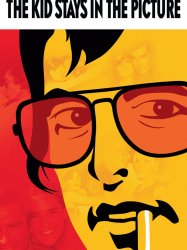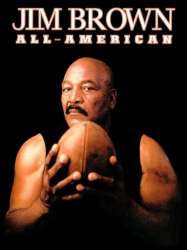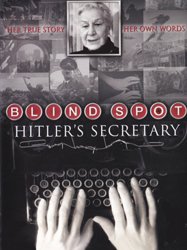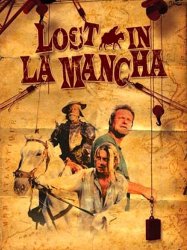Double Take is a belge film of genre Documentary
Double Take (2009)

If you like this film, let us know!
- Infos
- Casting
- Technical infos
- Photos
- Videos
- Film quotes
- Characters
- Music
- Awards
Double Take is a 2009 essay film, directed by Johan Grimonprez and written by Tom McCarthy. The plot is set during the Cold War and combines both documentary and fictional elements. The protagonist is a fictionalised version of Alfred Hitchcock, who unwittingly gets caught up in a double take. The backdrop of the film charts the rise of the television in the domestic setting and with it, the ensuing commodification of fear during the cold war.
Double Take is a Belgian-Dutch-German co-production and premiered in Europe at the 2009 Berlin Film Festival and in the U.S. at the 2010 Sundance film Festival.
Synopsis
Inspired by Jorge Luis Borges' short story 25th August, 1983, Double Take's narrative plot is based on a fictional encounter Alfred Hitchcock has with an older version of himself. Whilst on set of his 1962 film The Birds, Hitchcock calls a twelve-minute break in order to answer a phone call in one of the universal studio buildings. After a foreboding encounter with a security guard, Hitchcock finds his way into a room similar to the tearooms in both the Chasen's hotel in Los Angeles and the Claridge's hotel in London. Here, Hitchcock and his doppelgänger meet. The ensuing conversation between the two is characterized by personal paranoia and distrust where the younger Hitchcock is in deep fear of his older alter ego.Comments
Leave comment :
Suggestions of similar film to Double Take
There are 8880 with the same cinematographic genres, to have finally 70 suggestions of similar films.If you liked Double Take, you will probably like those similar films :

98, secrets d'une victoire (2018)
, 1h45Origin France
Genres Documentary
Themes Sports films, Documentary films about sports, Association football films
Rating70%





Vingt ans après leur victoire à la Coupe du monde de football de 1998, l'ensemble des joueurs et membres du staff de l'équipe de France partagent leurs souvenirs de leur parcours durant cette compétition ; du premier match victorieux contre l'Afrique du Sud à la finale au scénario idéal contre le Brésil, en passant par le but en or contre le Paraguay, les tirs au but contre l'Italie et la demi-finale disputée contre la Croatie, ainsi que les à-côtés, comme la vie à Clairefontaine ou les changements dans l'opinion publique et les médias.
 , 55minutes
, 55minutesGenres Documentary
Themes Environmental films, Seafaring films, Transport films, Documentary films about business, Documentary films about environmental issues
The area was originally considered worthless by European-Australian settlers, who fenced it off and abandoned it. The town was established around the start of the 20th century by German immigrant settlers. Its population increased after the first and second World Wars due to the government's policies of subsidies to encourage settlement by veterans. The people of Rainbow have struggled to eke out an existence for more than three generations, with global economics and government policy compounding the difficulties of marginal farming. The film draws from home movies from the 1940s to portray the people in this town.

The Kid Stays in the Picture (2002)
, 1h33Directed by Nanette Burstein, Brett Morgen
Origin USA
Genres Documentary
Themes Documentary films about business, Documentary films about the film industry, Documentaire sur une personnalité
Actors Robert Evans, Eddie Albert, Norma Shearer, Ali MacGraw, Francis Ford Coppola, Catherine Deneuve
Rating72%





The book chronicles Evans' rise from childhood to radio star to film star to production chief of Paramount Pictures to independent producer, his marriage to Ali MacGraw, his downfall including his 1980 cocaine bust and implication in the murder of Roy Radin, aka "The Cotton Club Murder", his banishment from Paramount Pictures, and his return to the studio in the early 1990s.

Jim Brown: All-American (2002)
, 2h20Directed by Spike Lee
Origin USA
Genres Biography, Documentary
Themes Sports films, Documentary films about sports, American football films, Documentaire sur une personnalité
Actors Raquel Welch, Oliver Stone, Melvin Van Peebles, Mario Van Peebles, Fred Williamson, Bernie Casey
Rating63%






Je me souviens (2002)
, 47minutesOrigin Canada
Genres Documentary
Themes Films about racism, Documentary films about racism, Documentary films about law, Documentaire sur une personnalité, Documentary films about politics, Political films, Documentary films about Quebec politics

India: Kingdom of the Tiger (2002)
, 42minutesDirected by Bruce Neibaur
Origin Canada
Genres Documentary
Themes Films about animals, Documentary films about nature
Actors Christopher Heyerdahl
Rating60%





The plot is loosely connected to the documental stories published in Jim Corbett's 1944 bestselling book Man-Eaters of Kumaon. Narrator of the film is Jim Corbett. In the film, Corbett, who is portrayed by Christopher Heyerdahl, is asked to kill a man-eating tiger who killed a young woman in Kumaon. Corbett arrives to Kumaon and meets with local people. The sister (Mishra Smriti) of the victim takes Corbett to the killing site. They together ambush the man-eater and Corbett kills the tiger from the machan. During this plot, the narration (by Corbett) contains stories of the history of India and the Kumaon region, as well as the efforts to save Indian tigers.
 , 1h27
, 1h27Genres War, Documentary
Themes Films about racism, Films about religion, Documentary films about racism, Documentary films about law, Documentary films about war, Documentary films about historical events, Documentaire sur une personnalité, Documentary films about politics, Documentary films about religion, Political films, Films about Jews and Judaism, Documentary films about World War II
Rating72%






Lost in La Mancha (2002)
, 1h33Origin United-kingdom
Genres Documentary
Themes Films about films, Documentary films about business, Documentary films about the film industry, Documentary films about films, Buddy films
Actors Jeff Bridges, Terry Gilliam, Johnny Depp, Jean Rochefort, Vanessa Paradis, Tony Grisoni
Rating72%





Pendant l'été 2000 en Espagne, Fulton et Pepe suivent, pour en réaliser le making of, le tournage de ce qui aurait dû être The Man Who Killed Don Quixote, un film que projette de réaliser Terry Gilliam depuis plusieurs années. Jean Rochefort doit tenir le rôle de Don Quichotte. Johnny Depp et Vanessa Paradis font également partie de la distribution. Cependant, le tournage tourne vite à la catastrophe : problèmes d'organisation, conflits personnels, vols intempestifs de F16 de l'armée de l'air américaine basée en Espagne sur le site de tournage, pluie diluvienne dans un lieu désertique qui dégrade le matériel et altère le décor – le désert servant de lieu de tournage devenant verdoyant le lendemain du déluge –, maladie de Jean Rochefort qui empêchera celui-ci de jamais remonter à cheval et l'écarte des plateaux.
 , 1h32
, 1h32Genres Documentary, Musical
Themes Films about music and musicians, Documentary films about music and musicians, Documentaire sur une personnalité, Musical films
Actors Jeff Tweedy, Fred Armisen
Rating73%






Horns and Halos (2002)
, 1h30Directed by Michael Galinsky
Origin USA
Genres Drama, Biography, Documentary
Themes Films about writers, Documentary films about historical events, Documentaire sur une personnalité, Documentary films about politics, Political films
Rating71%





 Connection
Connection